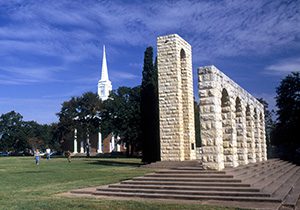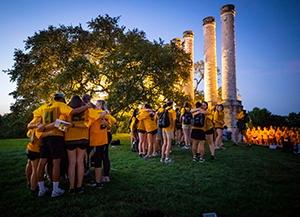UMHB acknowledges shared history with Baylor
The University of Mary Hardin-Baylor acknowledged a commission report that revealed the founders of Baylor University were slaveholders is consistent with its understanding of the two university’s “shared history.”

Baylor University’s Commission on Historic Campus Representations publicly released its 90-page report on March 23. The commission reported founders Judge R.E.B. Baylor, James Huckins and William Tryon were slaveholders, and it recommended creation of a new monument on Founders Mall in Waco recognizing the “unknown enslaved” who labored to construct Baylor’s original campus at Independence.
The Republic of Texas granted a charter in 1845 to Baylor University in Independence that provided for both male and female departments. The female department gained its own charter in 1866, moved to Belton years later and eventually became UMHB. The male department of Baylor in Independence and the University of Waco consolidated in 1886 to form Baylor University in Waco.
“We are grateful that our shared founders worked with conviction to establish the first Baptist university in Texas, but shamefully they were also owners of enslaved people,” a statement released by UMHB said.
“While the terrible actions of these individuals cannot be eliminated, UMHB believes that all truth is grounded in God and that the pursuit of truth and the Christian faith are mutually reinforcing.
“In that spirit, UMHB will remember our founders for the work they did in establishing a Baptist university in the frontier of Texas while also acknowledging the parts of our history marred by the sins of these early leaders.”
Enslaved people built original campus
In addition to a series of recommendations regarding monuments and memorials on the Baylor campus in Waco, the Commission on Historic Campus Representations also offered findings and recommendations regarding the original site of the male department at Windmill Hill and the female department at Academy Hill, both in Independence.
“Baylor University’s early history at Windmill Hill and Academy Hill in Independence has not been told in a balanced fashion,” the report stated. “Visitors to the historic site today learn only a portion of the story that needs to be told about the circumstances surrounding the history of Independence and Washington County as it relates to Baylor University’s location there during the 19th century.
“For instance, the historical representations currently at Independence do not educate visitors about enslaved people and the economy of enslavement that almost certainly provided labor, materials and funding necessary to build the structures that existed at that location during the early decades of Baylor’s existence.”

The commission recommended a replica of the suggested monument on Founders Mall to the “unknown enslaved” be erected at Baylor Park on Windmill Hill, new displays at Independence be created “to bring clarity and balance to the narrative,” the Texas Historical Commission markers in Independence be updated to include information on the slave economy and the story of the “unknown enslaved” be included in Baylor Line Camp activities at Independence for incoming students.
The commission also recommended that Baylor work in collaboration with UMHB and the Independence Preservation Trust to rewrite historical plaques at the entrance to Academy Hill, as well as displays at the nearby Texas Baptist Historical Museum, overseen by the Baptist General Convention of Texas.
In its public statement, UMHB pledged to fulfill that recommendation.
“UMHB and Baylor University will work together to update markers and displays at the original site of the female department in Independence, Texas, to incorporate the full history of our early years, specifically as it relates to the roles of enslaved people,” the statement read.
The statement noted UMHB engaged the Renew Partnerships consulting group last August to help provide guidance as the university examines how racism affects people of color on its campus.
“Renew Partnerships has an established track record in helping colleges identify sources of racial injustice and how to address those problems in practical and biblically sound ways,” the statement said